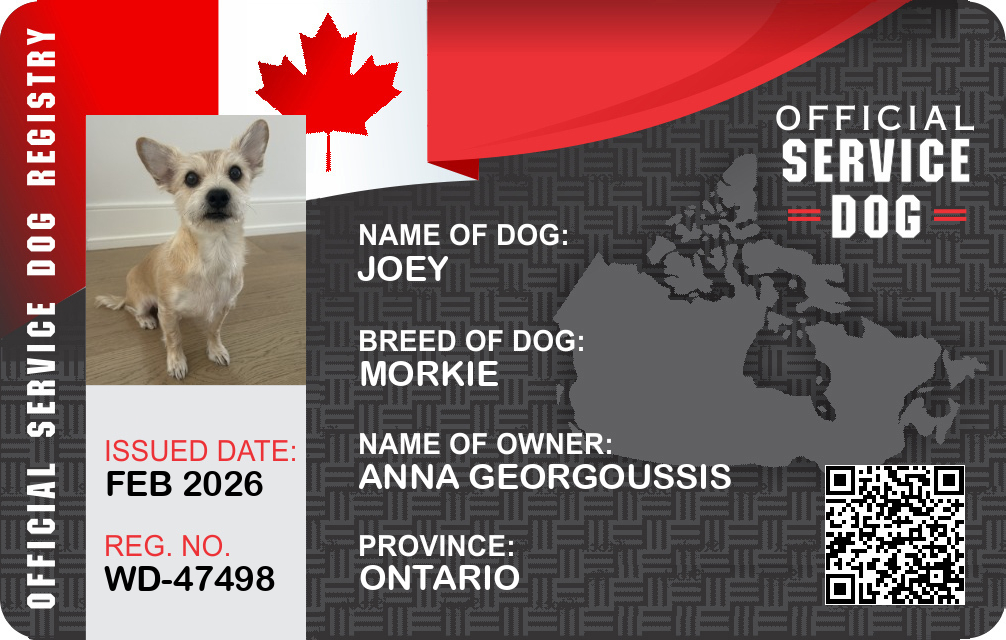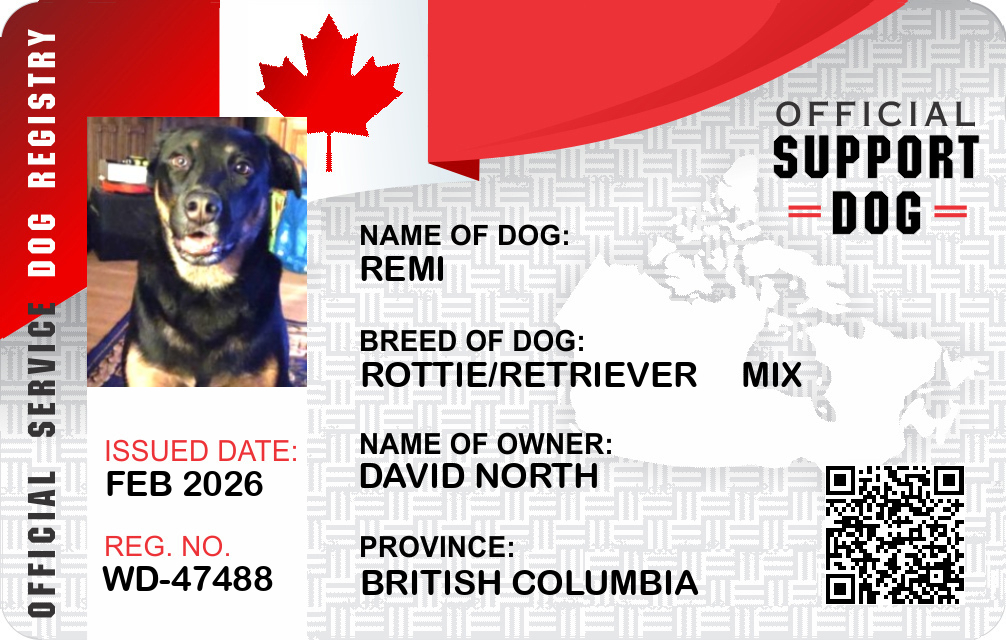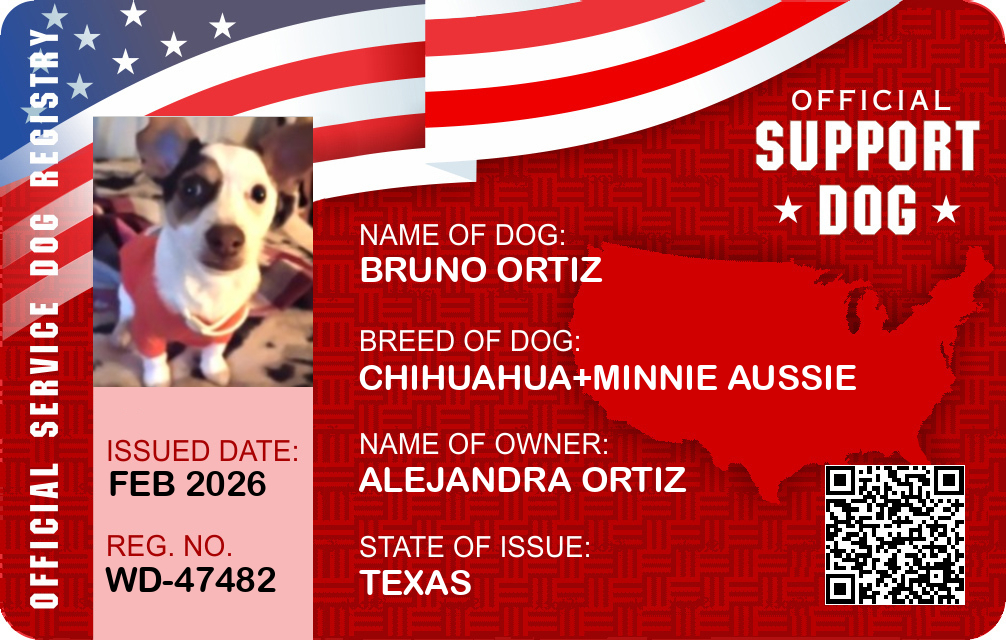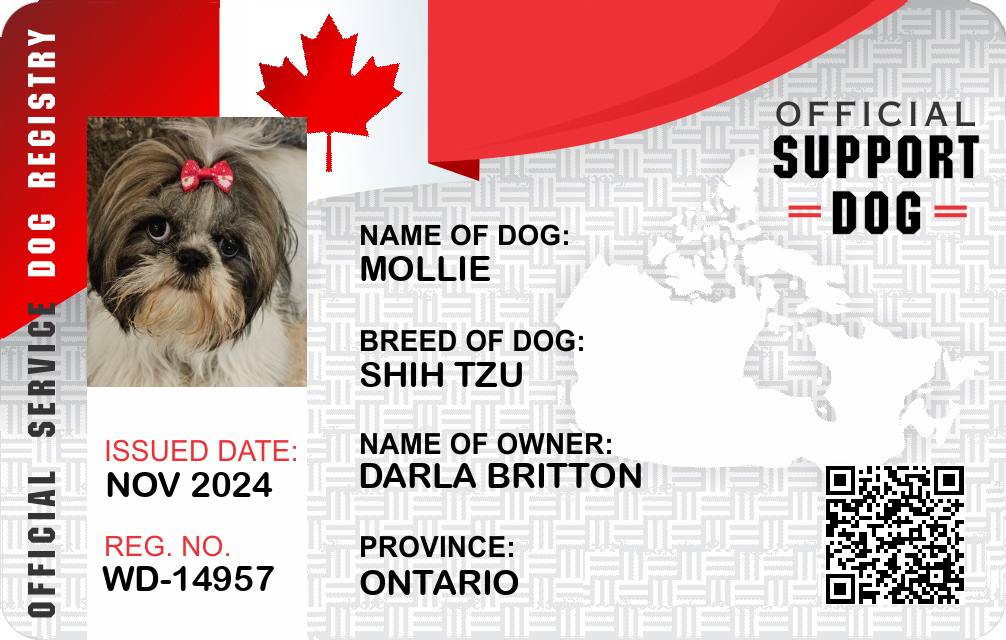Nebraska Service Dog Laws
Get Your Documents
Example State Cards


Overview of Service Dog and Legal Definitions in Nebraska
The interplay of federal and state laws creates a comprehensive framework that determines the rights and responsibilities associated with service dogs, providing essential guidance to handlers, business owners, landlords, and the general public in Nebraska.
What is a Service Dog?
A service dog is defined as a canine individually trained to perform tasks or assist an individual with a disability. This can include a wide array of functions, such as guiding individuals who are visually impaired, alerting those who are hearing impaired, pulling a wheelchair, or detecting and alerting about seizures, among others. The primary focus is on actions directly related to mitigating the handler’s disability.
How Service Dogs Differ from Other Types of Assistance Animals
Service dogs are distinct from other assistance animals in their specialized training. Unlike emotional support animals (ESA) or comfort animals, which provide companionship and help alleviate symptoms of psychological disorders, service dogs are trained to perform specific tasks. ESA, while offering therapeutic benefits, do not receive the same level of public access rights under the ADA. Additionally, while therapy animals provide emotional support to many people within group settings, they, like ESA, do not qualify for the same legal protections as service dogs.
Key Federal Laws Affecting Service Dogs (e.g., ADA, FHA, ACAA)
Several federal laws intersect to provide a framework for service dog regulation:
- Americans with Disabilities Act (ADA): This act stipulates that service dogs are allowed in public accommodations, prohibiting discrimination on the basis of disability. The ADA requires that service animals must be harnessed, leashed, or tethered unless these devices interfere with the service animal’s work or the individual’s disability prevents their use.
- Fair Housing Act (FHA): Through this act, individuals with disabilities are afforded the right to keep a service animal or ESA in housing situations that otherwise have a no-pet policy.
- Air Carrier Access Act (ACAA): This governs air travel, ensuring that service animals can accompany their handlers in the cabin, given that appropriate documentation may be provided when necessary.
Understanding these federal laws is crucial as they provide a baseline level of rights across the United States, including Nebraska.
State-Specific Service Dog Laws in Nebraska
Nebraska has instituted its own regulations complementing federal laws, aiming to address specifics not fully covered by federal statutes.
Housing Rights and Responsibilities
Under Nebraska state law, service dogs are recognized in housing accommodations covered by the FHA. Landlords must accommodate tenants with disabilities who need a service dog, even in properties with “no pet” policies. Tenants cannot be charged pet fees for their service animal, but they can be held responsible for any damage caused by the animal. Documentation verifying the need for a service dog may be requested if the disability is not obvious, but this process must adhere to guidelines ensuring privacy and accessibility.
Public Access and Accommodation
In Nebraska, service dogs have the right to accompany their handlers into public spaces, such as restaurants, hotels, and stores, aligning with the ADA’s provisions. It is important to note that businesses may only ask two specific questions: whether the service animal is required due to a disability and what task the animal has been trained to perform. They cannot demand documentation, except during specific housing or travel arrangements.
Transportation and Travel Rules
Service dogs are permitted on public transportation in Nebraska under the protection of federal and state laws. This includes buses and trains, aligning with the ACAA for air travel. Airlines may require documentation or prior notification of service dogs, especially for international flights. Although service animals are generally permitted, it’s recommended to check specific airline policies well ahead of travel dates for any recent changes.
Employment and Workplace Considerations
In the workplace, service dogs are considered a reasonable accommodation under the ADA. Employers must engage in an interactive process to determine the necessity and accommodate the use of a service dog unless it presents an undue hardship. This might include modifications in the workspace to ensure access and safety.
Documentation, Requirements, and Processes in Nebraska
Service Dog Documentation and Who Can Issue It
While specific documentation is restricted by federal guidelines to prevent discrimination, certain situations may require some form of documentation, particularly in housing and travel. Legitimate documentation can only be issued by a healthcare provider or a professional familiar with the patient’s condition who can assert that the service dog is necessary for their daily functioning. Fraudulent documentation is not only unethical but could lead to significant legal consequences.
Landlord, Business, and Provider Verification Rules
Verification procedures must balance confidentiality with a legitimate need for information. Requests for documentation must adhere closely to ADA and FHA guidelines and focus on confirming the necessity of the animal without prying into personal medical histories. Businesses should avoid demanding documentation unnecessarily, limiting such requests to permissible circumstances like housing applications or certain travel verifications.
Rights, Limitations, and Legal Risks
Rights Service Dog Handlers Have in Nebraska
Handlers have the right to be accompanied by their service dogs in most public and private locations, without being charged extra fees or denied service. Their service dogs are allowed in restaurants, libraries, theaters, and any other place members of the public are allowed. Handlers should expect privacy with regards to their disability and to only answer pertinent questions concerning the dog’s task-oriented training.
Limits on Service Dog Protections and Common Restrictions
Service dog access rights come with specific limitations intended to maintain public safety and order. For instance, a service dog may be excluded if it is out of control or not housebroken. Moreover, public accommodation does not extend to places inherently private like surgical fields in hospitals. Understanding these limitations helps both handlers and establishments to plan and act appropriately without overstepping legal boundaries.
Penalties for Fraud or Misrepresentation
Misrepresenting a pet as a service animal is a punishable offense in Nebraska, reflecting a commitment to maintaining the integrity of service dog accommodations. Penalties can range from fines to more serious legal consequences, highlighting the importance of honesty and respect for the rights of individuals genuinely requiring service animals.
Practical Guidance for Service Dog Handlers in Nebraska
How to Qualify for a Service Dog Legitimately
To qualify for a service dog, one must be diagnosed with a disability as defined under the ADA. From there, the individual should consult with healthcare providers to determine which tasks the dog could be trained to perform that would aid in mitigating their disability. Proper training, either self-conducted or through a professional organization, completes the process necessary to establish a legitimate service dog.
How to Talk to Landlords, Airlines, and Employers
Communicating effectively with landlords, airlines, and employers involves a blend of asserting one’s rights and providing the necessary, legally allowable documentation. Handlers should focus on what the law allows them to share, provide pertinent documentation when legally required, and clearly articulate how their service dog assists them.
Summary of Service Dog Laws in Nebraska
Navigating the legal landscape of service dog laws in Nebraska requires an understanding of both federal and state regulations to ensure compliance and protect rights. Through careful research, comprehension of responsibilities, and adherence to legitimate channels for documentation and verification, handlers can enjoy the benefits afforded to them without unwarranted complications.
Key Rights and Limitations for Service Dog Handlers in Nebraska:
- Rights:
- Service dogs can access public spaces without charge.
- Housing accommodations must accept service animals even with pet restrictions.
- Employment settings require reasonable accommodations for service dogs.
- Limitations:
- Service dogs must be under control and housebroken.
- Some areas have inherent restrictions not applicable to all spaces.
- Fraudulent representation of pets as service dogs incurs penalties.
- Practical Tips:
- Confirm federal and state rules before travel or renting.
- Carry documentation justifying the service need for airlines and certain housing needs.
- Engage in informed discussions with employers and landlords about service dog accommodations.
Informed navigations of these legal frameworks enable smoother interactions and uphold the rights of individuals who rely on these vital service animals daily.
Get Your Documents
Example State Cards













